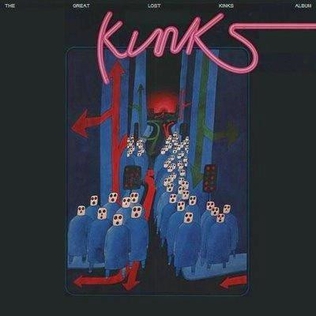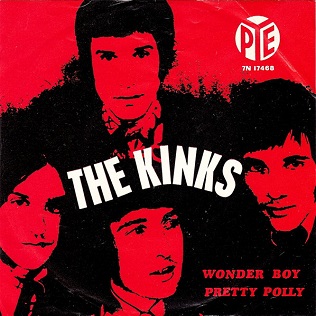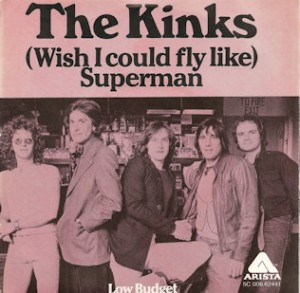
Lola Versus Powerman and the Moneygoround, Part One, commonly abbreviated to Lola Versus Powerman, or simply Lola, is the eighth studio album by the English rock band the Kinks, recorded and released in 1970. A concept album, it is a satirical appraisal of the music industry, including song publishers, unions, the press, accountants, business managers, and life on the road. Musically Lola Versus Powerman is varied, described by Stephen Thomas Erlewine as "a wildly unfocused but nonetheless dazzling tour de force", containing some of Ray Davies's strongest songs.

The Great Lost Kinks Album is a compilation album by the English rock band the Kinks. Released in the United States in January 1973, it features material recorded by the group between 1966 and 1970 that had mostly gone unreleased. The compilation served to satisfy Reprise Records after executives determined that the Kinks contractually owed them one more album, despite the band's departure from the label in 1971.

The Kinks were an English rock band formed in Muswell Hill, North London, in 1963 by brothers Ray and Dave Davies. They are regarded as one of the most influential rock bands of the 1960s. The band emerged during the height of British rhythm and blues and Merseybeat, and were briefly part of the British Invasion of the United States until their touring ban in 1965. Their third single, the Ray Davies-penned "You Really Got Me", became an international hit, topping the charts in the United Kingdom and reaching the Top 10 in the United States.

"Celluloid Heroes" is a song performed by the Kinks and written by their lead vocalist and principal songwriter, Ray Davies. It debuted on their 1972 album Everybody's in Show-Biz.

"Mr. Churchill Says" is a song written by Ray Davies and released by the Kinks. It appears on the 1969 album Arthur .

"Wonderboy" is a song by the English rock band the Kinks, released as a single in 1968. It stalled at number 36 in the UK charts, becoming the band's first single not to make the UK Top Twenty since their early covers. Despite this, it became a favourite of John Lennon of the Beatles, and, according to Ray Davies in his autobiography, X-Ray, "someone had seen John Lennon in a club and he kept on asking the disc jockey to play 'Wonder Boy' [sic] over and over again." Kinks guitarist Dave Davies praised the song, saying, "'Wonderboy' was a big one for us although it wasn't a hit. That was one song we really felt something for." However, bassist Peter Quaife's opinion towards the track was low, later stating that "[I] hated it ... it was horrible."

"I'm Not Like Everybody Else" is a song written by Ray Davies and first recorded by the Kinks in 1966 and released that year as the B-side of "Sunny Afternoon". The lead vocal is sung by Dave Davies, with occasional parts vocalized by his brother Ray, the band's usual lead singer. The song is a defiant anthem of non-conformity. It has been covered by various artists, notably the Chocolate Watchband in their 1968 rendition of the song.
"Wicked Annabella" is a song by the English rock band the Kinks from their 1968 album, The Kinks Are the Village Green Preservation Society (1968). Written by Ray Davies, it was recorded by the Kinks in July 1968. The song is Dave Davies's only lead vocal contribution on the album. It is one of several character studies on Village Green, recounting the wicked deeds of the local witch as a warning to children. Employing an eerie tone, its lyrics are darker than the rest of the album and have been likened by commentators to a dark fairy tale.

Kwyet Kinks is the third EP by the English rock band the Kinks. It was released on 17 September 1965 in the United Kingdom by Pye Records. In the United States, which had no corresponding market for EPs, Reprise Records instead used its songs as the basis for the November 1965 LP Kinkdom. Driven by the inclusion of the song "A Well Respected Man", Kwyet Kinks topped sales charts in Britain for several weeks.

"Come Dancing" is a 1982 song written by Ray Davies and performed by British rock group the Kinks on their 1983 album State of Confusion. The song was inspired by Davies' memories of his older sister, Rene, who died of a heart attack while dancing at a dance hall. The lyrics, sung from the perspective of an "East End barrow boy," are about the boy's sister going on dates at a local Palais dance hall.

"Picture Book" is a song by the English rock band the Kinks from their 1968 album The Kinks Are the Village Green Preservation Society. Written and sung by Ray Davies, the song's lyrics describe the experience of an ageing narrator flipping through a photo album reflecting on happy memories from "a long time ago". Recorded in May 1968, its cheerful sound is defined by the jangle of an acoustic twelve-string guitar and a disengaged snare drum. In continental Europe, the song was issued as the B-side of the album's lead single, "Starstruck", in November 1968. The same single was issued in the United States in January 1969, though it failed to appear in any charts.

"Polly" is a song by the English rock band the Kinks. It was released on a non-album single in April 1968, as the B-side to "Wonderboy". Written and sung by bandleader Ray Davies, the song was recorded in March 1968 during sessions for the band's 1968 album The Kinks Are the Village Green Preservation Society. Ray was initially inspired by the character Polly Garter in Dylan Thomas's 1954 radio drama Under Milk Wood, though his resulting character does not share anything with Thomas's besides the same name. The song is one of the few Kinks recordings from the late 1960s to possibly feature real strings, as arranged by David Whitaker.

"(Wish I Could Fly Like) Superman" is a song written by Ray Davies that was first released on the Kinks' 1979 album, Low Budget. The song, inspired by Superman: The Movie, employs a disco beat and lyrics that describe the singer's wish to be like the fictional character Superman. The song's disco style was created as a response to Arista Records founder Clive Davis's request for "a club-friendly record," despite Ray Davies' hatred of disco.

"Muswell Hillbilly" is a track recorded by British rock band The Kinks. It served as the title track to their 1971 album, Muswell Hillbillies.

"Drivin'" is a song written by Ray Davies of the Kinks which appeared on that group's 1969 concept album Arthur . It was released in the UK as the first single from the album, but failed to chart.

"Only a Dream" is a song released and performed by the British rock band The Kinks, written by the main songwriter of the band, Ray Davies. The song appeared on their 1993 album Phobia, the band's final LP.

"Ducks on the Wall" is a song by the British rock band the Kinks. The song, appearing on the band's 1975 album Soap Opera, was written by the band's principal songwriter, Ray Davies.

"Rock 'n' Roll Cities" is a song by the British rock group, the Kinks. The song appeared on the band's 1986 album, Think Visual, and, unlike most other Kinks songs, it was written by Dave Davies rather than his brother, Ray.

"Australia" is a song by the British rock band the Kinks, appearing on their 1969 album, Arthur . It was written by the band's main songwriter, Ray Davies.
"Monica" is a song by the English rock band the Kinks from their sixth studio album, The Kinks Are the Village Green Preservation Society (1968). Written and sung by Ray Davies, the song was recorded sometime between late 1967 and May 1968. The song features congas and a syncopated rhythm, indicating Davies's continued interest in calypso music. Its lyrics are a serenade for a prostitute and were partly inspired by Dylan Thomas's radio drama, Under Milk Wood (1954), though Davies kept the lyrics deliberately subtle to avoid a radio ban. Retrospective commentators have disputed the song's level of thematic cohesion with the others on Village Green.


















